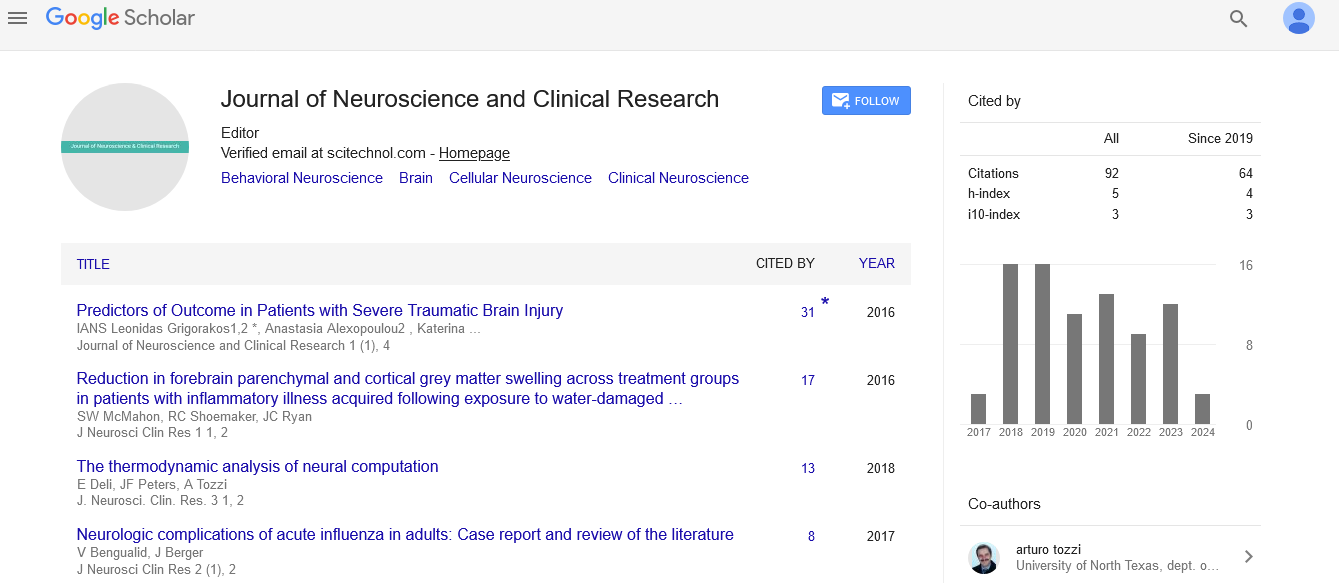Commentary, J Neurosci Clin Res Vol: 8 Issue: 4
Navigating the Labyrinth: Understanding Mental Disorders
Tae Hyeong Suk*
1Department of Medicine, Sungkyunkwan University School of Medicine, Seoul, Republic of Korea
*Corresponding Author: Tae Hyeong Suk,
Department of Medicine, Sungkyunkwan University
School of Medicine, Seoul 06351, Republic of Korea
E-mail: thngsuk@gmail.com
Received date: 24 November, 2023, Manuscript No. JNSCR-24-124045;
Editor assigned date: 28 November, 2023, Pre QC No. JNSCR-24-124045 (PQ);
Reviewed date: 14 December, 2023, QC No. JNSCR-24-124045;
Revised date: 21 December, 2023, Manuscript No. JNSCR-24-124045 (R);
Published date: 28 December, 2023, DOI: 10.4172/Jnscr.1000172
Citation: Suk TH (2023) Navigating the Labyrinth: Understanding Mental Disorders. J Neurosci Clin Res 8:4.
Description
Mental health, an integral facet of overall well-being, encompasses our emotional, psychological, and social dimensions. However, the intricate landscape of the human mind is not immune to disruptions, leading to the emergence of mental disorders. "Navigating the labyrinth: understanding mental disorders" embarks on a journey to illuminate the complexities of mental health challenges, exploring their origins, manifestations, and the imperative quest for effective interventions.
The mosaic of mental health: A holistic perspective
Mental health is a multifaceted mosaic, intricately woven from genetics, environment, and individual experiences. This chapter provides a holistic perspective on mental health, emphasizing the interplay of biological, psychological, and social factors in shaping our mental well-being. Understanding mental health as a continuum sets the stage for exploring the labyrinth of mental disorders.
Unraveling the roots: Genetics and neurobiology
The roots of mental disorders often extend into the intricate tapestry of genetics and neurobiology. This chapter delves into the genetic and neurobiological underpinnings of mental health challenges, exploring how variations in genes and disruptions in neural circuits can contribute to vulnerabilities. Understanding these foundations sheds light on the biological roots of mental disorders.
The impact of environment: From childhood to adulthood
While genetics and neurobiology set the stage, environmental factors play a crucial role in the manifestation of mental disorders. This chapter examines how early childhood experiences, trauma, stress, and societal influences can contribute to the development of mental health challenges. The interplay between nature and nurture becomes a key theme in unraveling the labyrinth of mental disorders.
The spectrum of disorders: From anxiety to psychosis
The labyrinth of mental disorders encompasses a broad spectrum, each with its unique manifestations and challenges. This chapter explores prevalent disorders such as anxiety, depression, bipolar disorder, schizophrenia, and others. By examining the distinctive features of each disorder, the chapter aims to demystify the spectrum of mental health challenges.
Breaking the stigma: Understanding and recognition
Stigma remains a significant barrier to addressing mental health challenges. This chapter delves into the societal perceptions and misconceptions surrounding mental disorders, emphasizing the importance of understanding and recognition. By fostering empathy and dispelling myths, the chapter seeks to break down the barriers that hinder open discussions and compassionate support for those facing mental health challenges.
Diagnosing the complexity: Challenges in mental health assessment
Diagnosing mental disorders is a complex process that involves clinical assessments, interviews, and consideration of various criteria. This chapter explores the challenges in mental health assessment, including the subjective nature of symptoms and the need for a comprehensive understanding of an individual's context. By examining the nuances of diagnosis, the chapter aims to illuminate the intricacies of identifying and categorizing mental health challenges.
Personal narratives: Voices of lived experience
Personal narratives provide a poignant lens through which to understand mental health challenges. This chapter shares the stories of individuals who have navigated the labyrinth of mental disorders, highlighting their experiences, coping mechanisms, and paths to recovery. These narratives serve to humanize mental health challenges, fostering empathy and dispelling misconceptions.
Treatment avenues: Beyond medication
Treatment for mental disorders extends beyond medication, encompassing various therapeutic modalities. This chapter explores psychotherapy, Cognitive-Behavioral Therapy (CBT), Dialectical Behavior Therapy (DBT), and other interventions that empower individuals to navigate the labyrinth of mental health challenges. The chapter emphasizes the importance of personalized and holistic approaches in fostering recovery.
Innovations in mental health: Technology and beyond
Advancements in technology have opened new frontiers in mental health care. This chapter explores innovations such as telehealth, mobile applications, and virtual reality that offer novel avenues for support, monitoring, and intervention. Embracing these technological advancements is crucial in enhancing accessibility and effectiveness in mental health care.
Towards mental wellness: Community, advocacy, and hope
The journey towards mental wellness involves collective efforts at the community, societal, and global levels. This chapter explores the role of community support, advocacy, and the cultivation of hope in fostering mental well-being. By addressing systemic challenges and promoting inclusivity, the chapter envisions a future where mental wellness is prioritized, and the stigma surrounding mental health challenges is eradicated.
Conclusion
"Navigating the labyrinth: understanding mental disorders" concludes with a call to navigate the labyrinth of mental health challenges together. The complexities of mental disorders demand a collective effort, from fostering awareness and empathy to advancing research and dismantling stigma. By understanding the multifaceted nature of mental health and embracing a compassionate, holistic approach, society can create a supportive environment where individuals facing mental health challenges can find understanding, resilience, and hope. The journey continues, and through collaboration and understanding, we can navigate the labyrinth with compassion and solidarity.
 Spanish
Spanish  Chinese
Chinese  Russian
Russian  German
German  French
French  Japanese
Japanese  Portuguese
Portuguese  Hindi
Hindi 